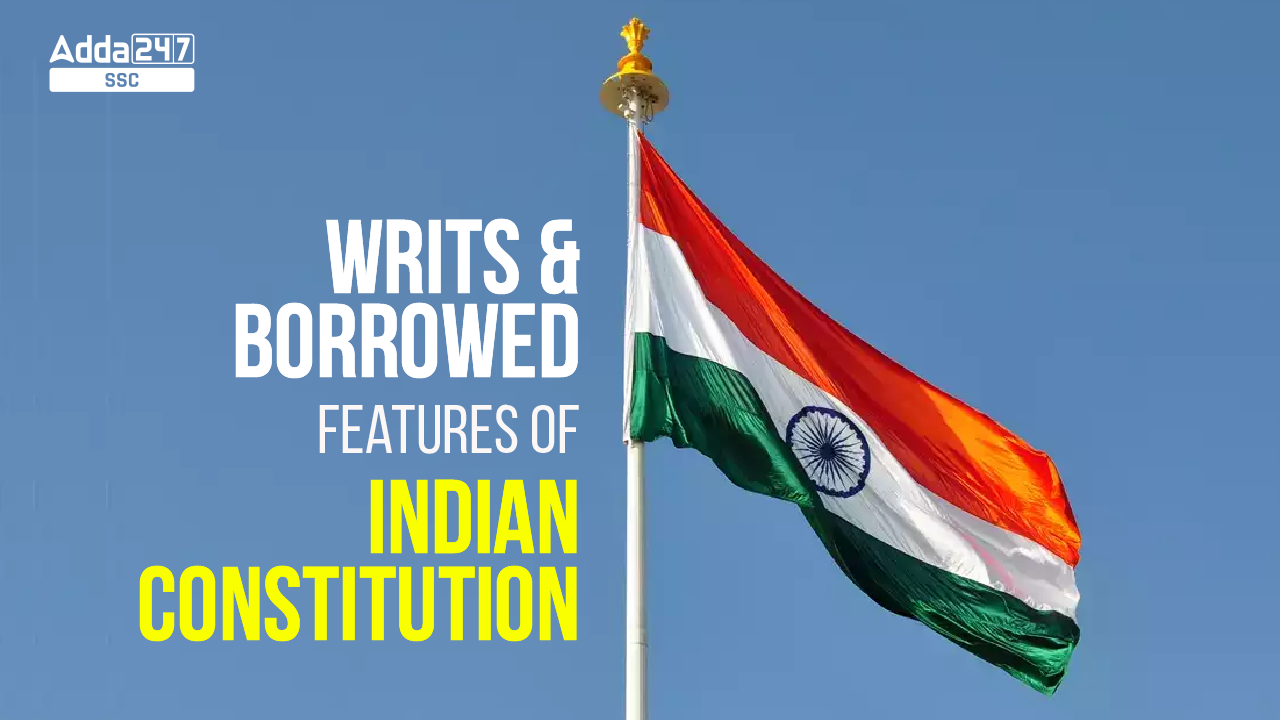General Awareness is a crucial section for various government exams like SSC, Railways, UPSC and within General Awareness, the Polity subject has the highest weightage. In the SSC CGL exam, around 5-6 out of the 25 questions in the General Awareness section are usually from the Polity subject. Recognizing the importance of Polity, we are providing notes on the most crucial topics in this area. One such topic that is asked repeatedly in these exams is the “Writs and Borrowed Features of the Indian Constitution”.
To help the candidates preparing for these government exams, we have created this article to explain the details of the Writs and Borrowed Features of the Indian Constitution. This information can be very useful for your exam preparation and can help you score well in the Polity section.
Writs In the Indian Constitution
The Constitution has constituted the Supreme Court as the guarantor and defender of the fundamental rights of the citizens. These writs are borrowed from English law where they are known as ‘prerogative writs’. The Supreme Court (under Article 32) and the high courts (under Article 226) can issue the writs of habeas corpus, mandamus, prohibition, certiorari, and quo warranto. Any individual, whose fundamental right has been violated, can directly move the Supreme Court for remedy. (Note– The Parliament (under Article 32) can empower any other court to issue these writs.)
Points to Remember:
- The Supreme Court can issue writs only for the enforcement of fundamental rights whereas a high court can issue writs not only for the enforcement of Fundamental Rights but also for any other purpose.
- A remedy under Article 32 is in itself a Fundamental Right and hence, the Supreme Court may not refuse to exercise its writ jurisdiction.
- On the other hand, a remedy under Article 226 is discretionary and hence, a high court may refuse to exercise its writ jurisdiction.
Let’s proceed to understand the meaning and scope of different kinds of writs mentioned in Articles 32 and 226 of the Constitution.
There are five types of writs under the Indian constitution.
1. Habeas Corpus
2. Mandamus
3. Certiorari
4. Prohibition
5. Quo-warranto
Habeas Corpus
- It is a Latin term that literally means ‘to have the body of’.
- It is an order issued by the court to a person who has detained another person, to produce the body of the latter before it. The court then examines the cause and legality of detention.
- This writ is a bulwark of individual liberty against arbitrary detention.
- The writ of habeas corpus can be issued against both public authorities as well as private individuals.
Mandamus
- It literally means ‘we command’.
- It is a command issued by the court to a public official asking him to perform the official duties that he has failed or refused to perform.
- It can also be issued against any public body, a corporation, an inferior court, a tribunal, or a government for the same purpose.
Prohibition
- It literally, means ‘to forbid’.
- It is issued by a higher court to a lower court or tribunal to prevent the latter from exceeding its jurisdiction or usurping a jurisdiction that it does not possess.
- The writ of prohibition can be issued only against judicial and quasi-judicial authorities.
Certiorari
- In the literal sense, it means ‘to be certified’ or ‘to be informed’.
- It is issued by a higher court to a lower court or tribunal either to transfer a case pending with the latter to itself or to squash the order of the latter in a case.
- It is issued on the grounds of excess of jurisdiction or lack of jurisdiction or error of law.
Note-
Previously, the writ of certiorari could be issued only against judicial and quasi-judicial authorities and not against administrative authorities. However, in 1991, the Supreme Court ruled that the certiorari can be issued even against administrative authorities affecting the rights of individuals.
Quo-Warranto
- In the literal sense, it means ‘by what authority or warrants’.
- It is issued by the court to enquire into the legality of the claim of a person to a public office.
- It prevents illegal usurpation of public office by a person.
- The writ can be issued only in case of a substantive public office of a permanent character created by a statute or by the Constitution.
List of Borrowed Features of the Indian Constitution
The Indian Constitution is the longest-written constitution in the entire world. The length of this document makes sure that the citizens of India are not denied any rights or privileges. It also sources many of its features from various countries around the world. The following points will help the candidates get an understanding of how many countries’ constitutions the founding fathers of the Indian constitution consult.
Britain
•Parliamentary government
• Rule of Law
•Legislative procedure
•Single citizenship
•Cabinet system
•Prerogative writs
•Parliamentary privileges
•Bicameralism
Ireland
• Directive Principles of State Policy
• Method of Election of the President
• Members’ nomination to the Rajya Sabha by the President
Unites the States of America
• Impeachment of the president
• Functions of president and vice-president
• Removal of Supreme Court and High Court judges
• Fundamental Rights
• Judicial review
• Independence of judiciary
• Preamble of the constitution
Canada
• Centrifugal form of federalism where the center is stronger than the states.
• Residuary powers vest with the center
• Centre appoints the Governors at the states
• Advisory jurisdiction of the Supreme Court
Australia
• Concept of Concurrent list
• Article 108 i.e. Joint sitting of the two houses
• Freedom of trade and commerce
USSR (Now Russia)
• Fundamental duties
• The ideals of justice (social, economic, and political), are expressed in the Preamble.
France
•Concept of “Republic”
•Ideals of Liberty, Equality, and Fraternity(contained in the Preamble)
Germany
• Fundamental Rights are suspended during the Emergency
South Africa
• Election of members of the Rajya Sabha
• Amendment of the Constitution
Japan
- Concept of “procedure established by Law”
- Appointment of Governor by Centre.
- Advisory Jurisdiction of the Supreme Court
| Check Related posts: | |
| State and Capitals in India | 8 Union Territories in India |
| Dams In India | Largest State of India |




 Upcoming Government Exams, Complete Govt...
Upcoming Government Exams, Complete Govt...
 SSC Exam Calendar 2025–26 Out, Check All...
SSC Exam Calendar 2025–26 Out, Check All...
 RRB JE 2024 Notification, CBT 2 Exam Dat...
RRB JE 2024 Notification, CBT 2 Exam Dat...


